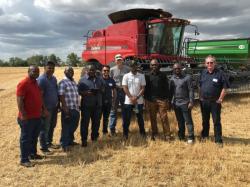African Flour Millers Visit Wheat Harvest
June 21, 2018 | 3 min to read

Flour milling executives from Sub-Saharan Africa are in the U.S. plains states to get the latest information about the hard red winter (HRW) wheat harvest, crop quality and value.
U.S. Wheat Associates (USW), the U.S. wheat industry's export market development organization, anticipates new opportunities to export more U.S. hard red winter wheat to these countries. To ensure key wheat buyers in the region get the latest information they need about HRW quality and value, USW brought a team of flour milling executives from Nigeria, South Africa, Tanzania and Liberia to Texas, Oklahoma and Kansas June 11-21, 2018.
While in Kansas, the flour millers toured the Grain Craft Wheat Quality Lab in Wichita, the Kansas Wheat Innovation Center and IGP Institute in Manhattan and Cargill Elevator and wheat harvest near Salina.
Aaron Harries, Vice President of Research and Operations at Kansas Wheat, traveled with the group.
"Nigerian flour millers continue to be extremely good customers for Kansas wheat farmers," he said. "About half of the Kansas wheat crop is exported every year, and Nigeria has been a top buyer in recent years. They love the consistent quality they get in wheat from the U.S. We want to be able to grow our market share in the Sub-Saharan region and build the same relationship of trust with our buyers in South Africa."
Nigeria has been a solid market for U.S. HRW wheat for the past couple decades. U.S. wheat farmers, through the trade servicing and technical support of U.S. Wheat Associates (USW), funded with strong support from USDA's Foreign Agricultural Service, helped establish flour milling as a highly successful industry in the west African nation. Hard red winter (HRW) became the standard source of flour for pan bread and instant noodles in Nigeria. Unfortunately, the U.S. has lost marketing share in the recent years, mainly due to cheaper wheat from other origins, including Russia, Europe, Argentina and Australia.
U.S. HRW wheat remains the dominant source of flour to make instant noodles and wet pasta in Nigeria and a key ingredient as a blending wheat for pan bread flour. USW continues to keep buyers informed about U.S. wheat quality and a long-term effort to provide regular trade service, including this annual trade team visit, as well as training and technical assistance to the major Nigerian flour milling companies.
South Africa is a smaller market than Nigeria, but annual per capita wheat consumption is the highest in the Sub-Saharan region. Though it varies widely year to year, South Africa produces about half of its annual wheat consumption. Wheat breeders and flour millers are working together to develop improved protein varieties of wheat for South African farmers so it can be blended with imported wheat. Millers prefer imports of HRW and similar classes of German and Argentinian wheat and tend to buy more of whatever is the least expensive.
U.S. HRW was much more competitive the past two marketing years. In fact, South African millers imported HRW for the first time in five years in 2016/17. USW kept up the momentum by bringing representatives from a prominent milling company to the United States to observe production and be even better prepared to take advantage of favorable prices this marketing year. Although their pace of imports is down, South African millers have kept HRW in their blends again this year.
Before their time in Kansas, the team visited the Port of Corpus Christi, Tulsa Port of Catoosa, export elevators in Texas and a wheat farm in Oklahoma.
Funding for the visit came from USDA's Foreign Market Development export programs with support from Texas, Oklahoma and Kansas Wheat Commissions.
Source: Kansas Wheat Commissions
